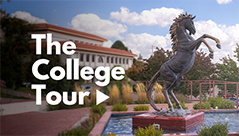Two WNMU faculty members, Associate Professor of Sociology and Criminal Justice Damon Bullock and Associate Professor of Management David Scarborough, spent part of the summer on a faculty exchange with La Universidad del Valle de Atemaja (UNIVA) in La Piedad, Michoacán, Mexico.
The purpose of the exchange is multifold, said Bullock. It is partly an extension of the university’s educational mission, and it also helps to spread awareness of WNMU. In addition, faculty themselves are enriched by the experience.
For Scarborough, who is learning Spanish, the immersive experience was invaluable for its effect on his Spanish language listening skills. “If you really want to be conversant [in another language] you have to be there and listen, so that you are getting context as well as the auditory input,” he said.
For Bullock, the experience connected directly to his academic specialization. “Being a sociologist,” he said, “I have always been interested in diversity and culture, so it feels good to see other cultures and ethnicities, to experience their food, their culture, their social dynamics, their religious practice, the social and systemic constructs that they have.” This kind of cultural immersion, said Bullock, “allows you to understand the fundamentals of being human” because when people wake up in Mexico, “they wake up every day, they work hard just like we do in the United States. They want to take care of their families just like we do in the United States.”
While Bullock teaches criminal justice and sociology at WNMU, at UNIVA La Piedad he teaches law students “from an interdisciplinary approach, primarily focused on human rights issues in the United States, such as elder abuse and systemic and institutional racism.”
Bullock, who first participated in the exchange with UNIVA La Piedad in 2016, said that his experiences in Mexico have also enriched his teaching at WNMU. “When I teach over here [in the United States], I have different references,” said Bullock, “If my focus is just on the United States, I am going to have a limited view that may lead me to be closed minded, biased, or prejudiced.” Immersion in another culture, said Bullock, can offer insight into one’s own culture. “When you go to different cultures . . . you have a reference point to compare with your own culture.”
While Bullock teaches primarily law students at UNIVA La Piedad, the students in Scarborough’s lectures were from a variety of disciplines. In the lectures, Scarborough focused on Artificial Intelligence, covering both its history and its modern developments. “I talked about how [Artificial Intelligence] is going to change everyone’s life, and I got a lot of good questions,” he said, “It was a really lively conversation in Spanish and English.”
Scarborough plans to return to La Piedad and is already thinking ahead to what he might teach on future trips. “I want to develop a comparative course in labor law and [human resources] practices,” he said, “[Mexico] is one of the only countries in the world that has labor law written into their constitution—fair wages, nondiscrimination, all of it—What they don’t have . . . is the administrative apparatus for enforcement” that the United States has.
In addition to teaching university students during the time in Mexico, Bullock also spent time meeting with community leaders and policy makers to discuss civil rights issues. During past trips, Bullock primarily met with municipal leaders, but during this trip he talked with more federal and state-level policy makers and agencies, such as the Michoacán legislature and the Office of Human Rights.
Bullock indicated that these conversations went very well. “In talking about elder abuse and systemic and institutional racism,” said Bullock, “I think that [Mexicans] are more accepting . . . than people are here. I think that [in the United States] there is a lot of bias.” In Mexico, he said, “due to them not having the racial history that we have in the United States and also due them being inclusive and accepting that someone that is Black, especially a Black man, can be intelligent, I think they are more accepting of the knowledge I bring.”
Bullock emphasized that he would encourage other faculty to take advantage of opportunities like the faculty exchange, “if not in Mexico, then in other countries. . . A lot of other countries really value Americans’ perspective.” Bullock added, “I would encourage faculty to be honest about what is happening in this country . . . When you [travel and speak] with authenticity, with sincerity, people can feel it . . . and they tend to trust what you say.”


